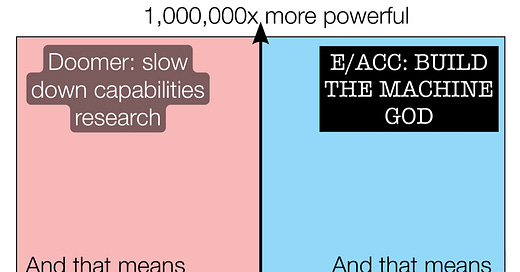What I Believe About e/acc, As It Relates To AI
my meager exploration of ai philosophy led me back to ancient wisdom
rather than rehashing the latest ai news, i’m going to write a more philosophical piece here about what i believe about e/acc, aka effective accelerationism. i’m writing this to better understand and share my beliefs about ai progress.
to start, i’m now writing this newsletter in all lowercase to separate myself from our eventual ai overlords, who i expect will most frequently write in the smartest way — which is to say, with perfect grammar. the exception to this is if ai’s want to trick humans into thinking they’re real, in which case writing in all lowercase might be a better strategy for them at some stage. language will change, as all things do.
e/acc was born on twitter/x circa ~may 31 or june 1, 2022, and codified with a set of philosophical tenets on substack on july 9, 2022. early twitter users who referenced the acronym were @bayeslord and @basedbeff. coincidentally, this weekend @basedbeff was doxxed by as guillaume verdon, who is the founder of extropic and was previously in physics & ai r&d at alphabet.
the movement’s roots stem from accelerationism, a range of ideas that call for increasing capitalistic growth, technological change, and other processes of social change to create radical transformations. nick land, an english philosopher, is one of the major thinkers related to accelerationism, and he coined the term “hyperstition,” a joining of the words “superstition” and “hyper” to describe something that is balanced between fiction and technology. in other words, these are ideas that accelerationists believe can bring about their own realities.
e/acc is particularly focused on the technological progress and ai part. its proponents believe that the progress of ai will lead to a better world, and must be pushed forward. the movement has some elements of utopianism and argues that humans need to build faster to ensure survival and propagate consciousness. in other words, it can’t be stopped and humanity should accelerate its progress.
a number of famous silicon valley technologists, including marc andreessen and garry tan, have endorsed the movement by placing e/acc in their twitter/x profiles. others associated with the movement include sam altman, yann lecun, andrew ng, and martin shkreli. a 2023 article by marc andreessen titled “the techno-optimist manifesto” is an important thought piece related to the movement.
critics of this movement have included the writer and software engineer molly white, who wrote an article on nov. 25, 2023 titled “effective obfuscation,” in which she said that the movement is simply a “new coat of philosophical paint.” she wrote, “we’ve already tried out having a tech industry led by a bunch of techno-utopianists and those who think they can reduce everything to markets and equations. let’s try something new, and not just give new names to the old.”
white draws some similarities with effective altruism, aka ea.
ea is the philosophical movement that was embraced by sam bankman-fried, the convicted fraudster and founder of ftx. ea developed in the 2000s and was coined in 2011. its philosophers include peter singer, william macaskill, and toby ord.
the ea philosophy stems from utilitarian thinking and emphasizes the global, equal consideration of interest. the idea is that if you saw a child drowning while on a walk, you would do everything to save it. so why not save people equally in other parts of the world? it seeks the most beneficial ways to benefit others. elon musk at one point described macaskill’s book as “a close match for my philosophy.”
ea’s proponents have been more skeptical about ai progress. as they see it, the most pressing problem in the world is to prevent an apocalypse where an agi exterminates us. most importantly, humans need to safely align agi with their interests.
e/acc’s are often critics of ea. as they see it, eas are often “decels” and “doomers” who want to slow down and regulate ai, at the cost of increasing power concentration.
this debate got louder during the openai saga of recent weeks, when e/acc proponent sam altman was ousted as ceo, and temporarily replaced by a “doomer” emmett shear.
so with that background out of the way, where do i stand? after reading more about these philosophies, i don’t stand with either of them.
in fact, i’m not entirely sure where i stand. and i’m okay with that. i empathize with the mindset that this technology will be super powerful. that said, i’m not sure that we have control as a society about whether to slow down or speed up this technology today. for example, if sam altman didn’t exist, i expect that somebody else would fill the gap to push the technology forward. the technology demands it. it already has a life of its own.
where i end up philosophically is that ai is already evolving on its own, and whatever happens, happens for the best. i’m not necessarily a techno-optimist. i’m a techno-pragmatist. that might be a naiive way of thinking. admittedly, i don’t want our species to die. i love my species. that said, i’m not sure how much control we will have. there are other forces at play. so on the question of speeding it up or slowing it down, i’d say let it be.
we can fight all we want — against each other, against ai, against centralization, against e/acc or ea. and i expect we will.
things will surprise us about this technology. rather than worrying and stressing about it today, i will enjoy watching it unfold. perhaps we can borrow from some ancient wisdom.
the master allows things to happen.
she shapes events as they come.
she steps out of the way
and lets the tao speak for itself.
- tao te ching, 45




